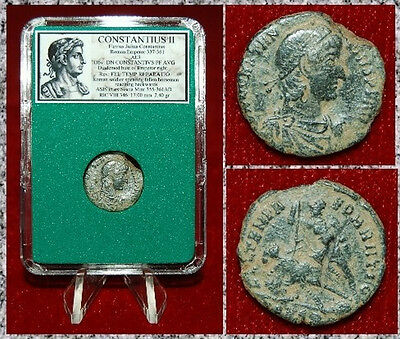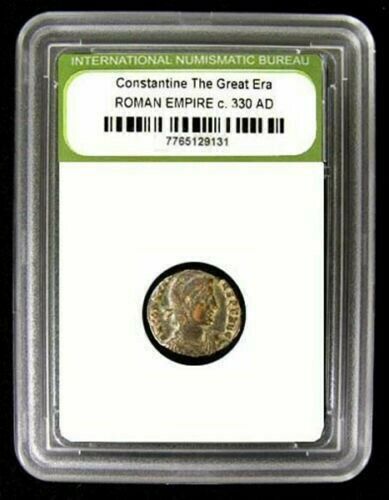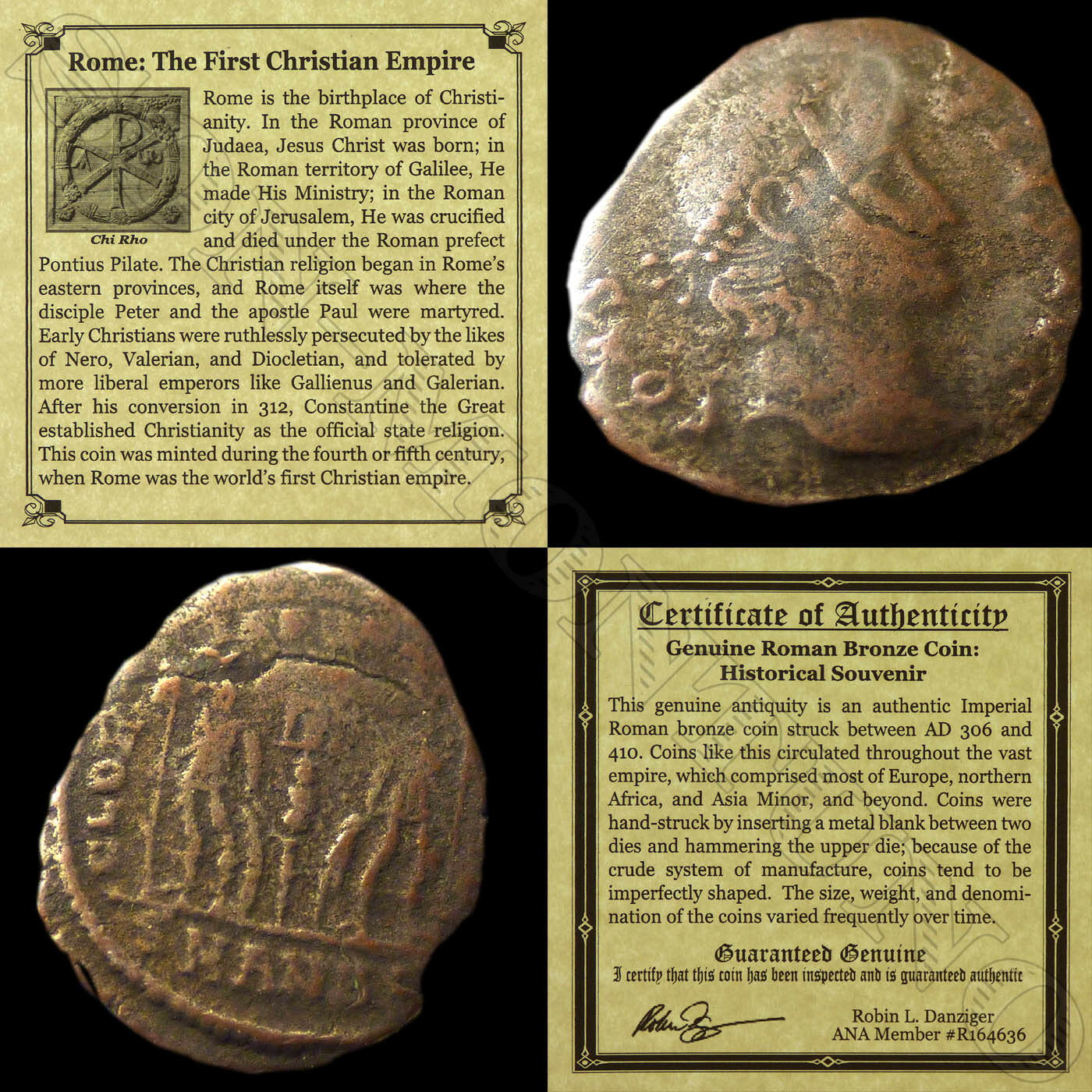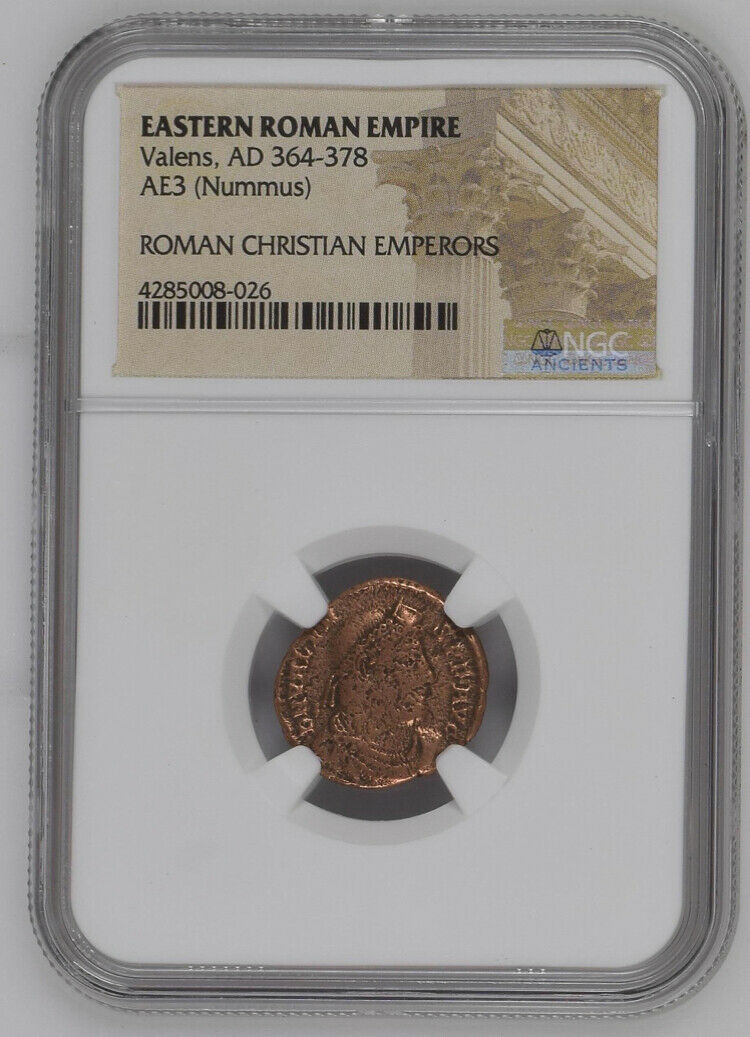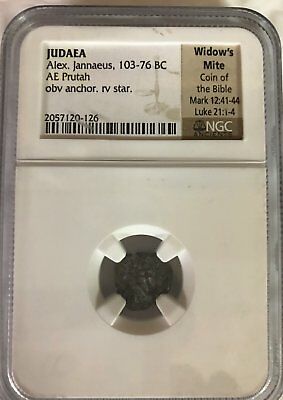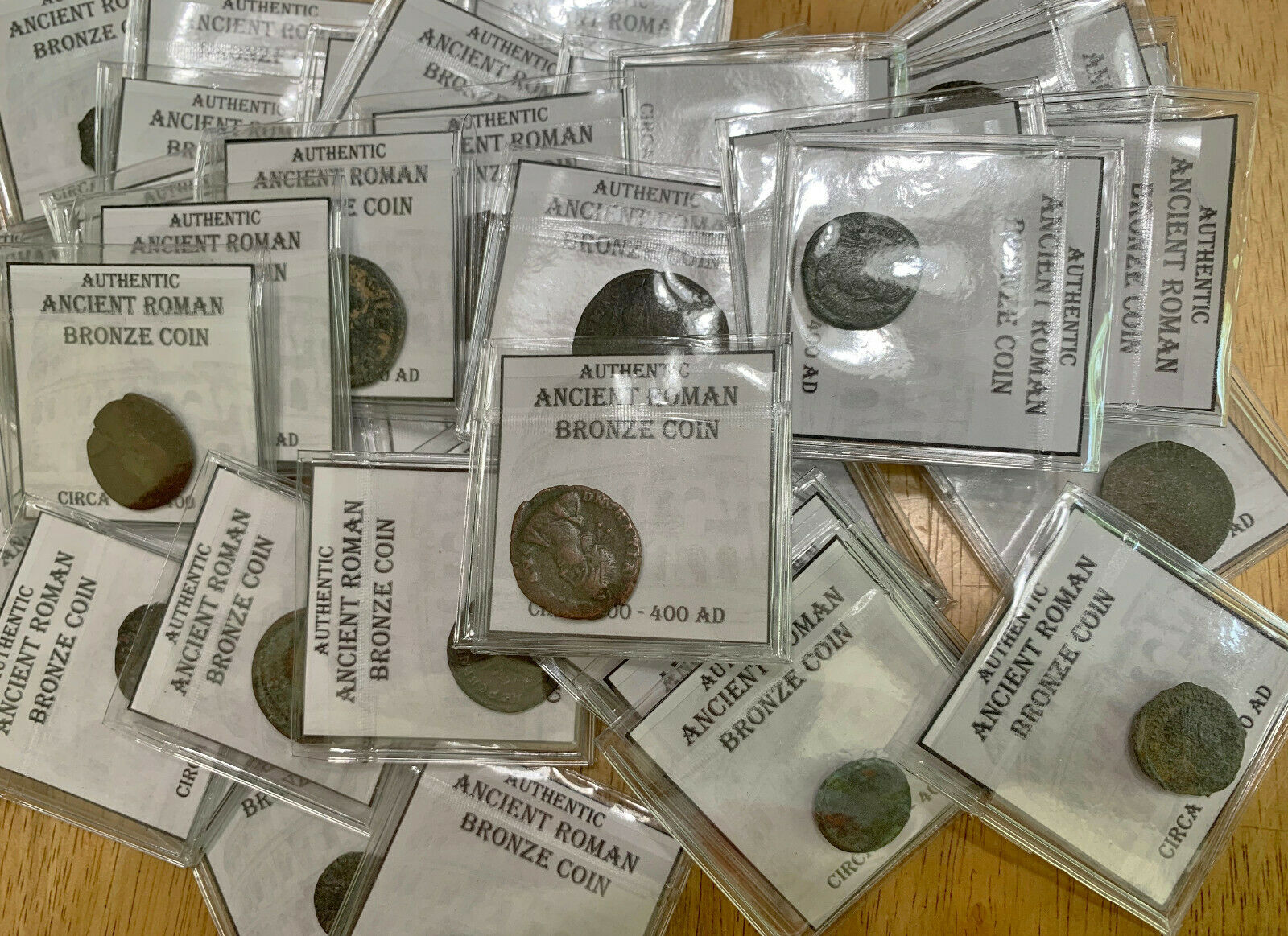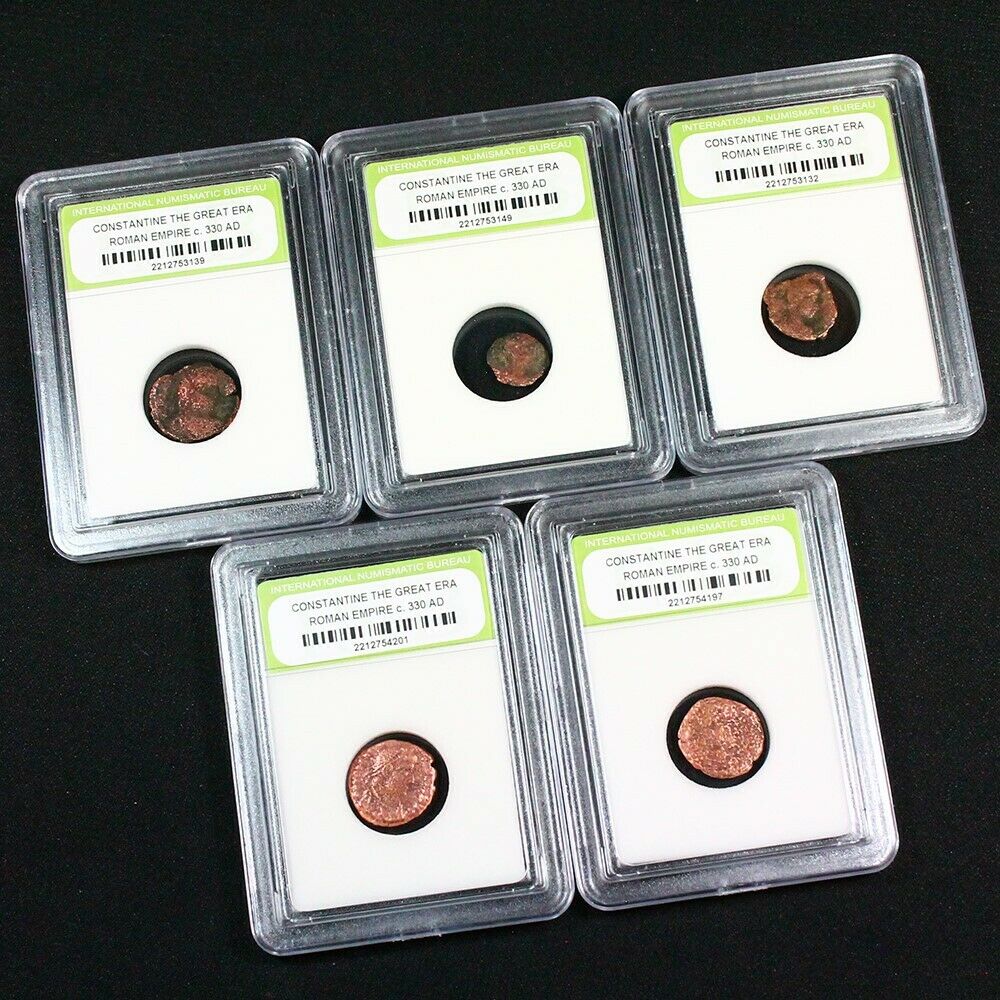-40%
Ancient Roman Empire Coin Constantius II Roman Soldier Spearing Fallen Horseman
$ 20.59
- Description
- Size Guide
Description
. href="https://emporium.auctiva.com/timelessthing" target="_blank">timelessthing store. style="text-decoration:none" href="https://emporium.auctiva.com/timelessthing" target="_blank">
. href="https://www.auctiva.com/?how=scLnk0" target="_blank">
Click to open supersize image
ROMAN EMPIRE
Ancient Coin
AE
3
Of
CONSTANTIUS II
(Roman Emperor 337-361 A.D.)
Obv: DN CONSTANTIVS PF AVG
Laureate
bust of
Constantius II
right
Rev: FEL TEMP REPARATIO
"Re-establishment of happy times"
Roman soldier spearing fallen horseman
1
7
.00 mm
PRIVATE
ANCIENT COINS COLLECTION
SOUTH FLORIDA ESTATE SALE
( Please, check out other ancient coins we have available for sale. We are offering 1000+ ancient coins collection)
ALL COINS ARE GENUINE
LIFETIME GUARANTEE
AND PROFESSIONALLY ATTRIBUTED
The attribution label is printed on archival museum quality paper
An interesting dramatic bronze coin of Constantius II,- one of the Constantine The Great sons. Roman soldier spearing a fallen horseman on reverse. This coin comes with display case, stand and attribution label attached as pictured.
The attribution label is printed on archival museum quality paper.
A great way to display an ancient coins collection. You are welcome to ask any questions prior buying or bidding. We can ship it anywhere within continental U.S. for a flat rate of 7.90$. It includes shipping, delivery confirmation and packaging material.
Limited Time Offer:
FREE SHIPPING
(only within the continental U.S.)
The residents of HI/AK/U.S. Territories and International bidders/buyers must contact us for the shipping quote before bidding/buying
Constantius II
Constantius II was born in Illyricum in August AD 317, the son of Constantine the Great and Fausta, and was proclaimed Caesar in AD 323.
In AD 337, at the death of his father Constantine, he acceded to the throne together with his two brothers Constantine II and Constans. But this accession by the three brothers was tainted by the murder of their cousins Dalmatius and Hannibalianus, whom Constantine had also intended as joint heirs. These murders are believed to have been masterminded by Constantius II.
In the eventual division of the empire between the three brothers, Constantius II received the east as his dominion, which largely corresponded with what his father had originally intended for him. It therefore appears that Constantine the Great had held Constantius II in high esteem, and had deemed him most able to deal with the menace of the Persians in the east.
Almost at once after the news of Constantine's death the Parthian King Sapor II (Shapur II) attacked the empire, with which he had been at peace for four decades.
In AD 338 Constantius II granted Constans control over his European territories, Thrace and Constantinople. Perhaps he thought it necessary to satisfy the ambitions of his younger brother by granting him more land thereby securing his western border in order to be able to freely engage with Sapor II in the east.
In any case by AD 339 Constans, whose relationship Constantine II was deteriorating, handed back control of the very same territories to Constantius II in order to assure his allegiance in the upcoming contest with Constantine II.
Constantius II, much like his father before him, was deeply involved in theological matters. Though he supported Arianism, a form of Christianity including aspects of Greek philosophy, which the 'Nicene Creed' brokered by his father had outlawed as heresy. Had Arius been excommunicated by Constantine's Council of Nicaea, then Constantius II rehabilitated him posthumously.
These religious sympathies of Constantius II at first led to grave disagreements between himself and his brother Constans, who like his father strictly adhered to the Nicene Creed, which for a while created a real threat of a war between the two.
The conflict in the east with Sapor II concentrated almost entirely on the strategic fortresses of Mesopotamia. Three times Sapor II besieged the fortress town of Nisibis, but failed to take it. Then by AD 350 the Parthian king needed to agree a truce with his Roman foe, in order to deal with tribal problems in the east of his own empire.
Meanwhile, Constantius II had become the sole legitimate Roman emperor. Had Constantine II declared war on his brother Constans in AD 340, he died in the attempt of invading Italy. Meanwhile Constans himself had been slain when Magnentius had usurped his throne in AD 350.
Things hung in the balance for a while, as the all-important Danubian legions could simply not make their minds up which one of the two rivals to support. And so, in a strange twist of fate, they chose niehter leader, but instead hailed their own 'Master of Foot', named Vetranio, as their emperor. Though rebellious as this might seem at first sight, it appeared to be in accordance with Constantius II. His sister Constantina was in Illyricum at the time and appeared to have supported Vetranio's elevation.
It all appears to have been a ploy by which the Danubian legions would be prevented from joining with Magnentius. For before the year was over, Vetranio had already relinquished his position and declared for Constantius II, formally handing over command of his troops to his emperor at Naissus. Thereafter Vetranio simply retired to Prusa in Bithynia.
Constantius II, preparing for the fight with Magnentius in the west, raised his 26 year-old cousin Constantius Gallus to the rank of Caesar (junior emperor) in order to have him take charge of the administration of the east whilst he would be commanding his armies.
What followed in AD 351 was an initial defeat by Magnentius at Atrans, as Constantius II tried to advance and force his way into Italy. As Constantius II retreated Magnentius sought to follow up his victory but was heavily defeated at the gruelling battle of Mursa in Lower Pannonia, which cost over 50'000 soldiers their lives. It was the bloodiest battle of the fourth century.
Magnetius withdrew to Italy, seeking to rebuild his army.
In AD 352 Constantius II invaded Italy, forcing the usurper of his brother's throne to withdrew further west into Gaul. In AD 353 Magnentius was once more defeated and lost control of the Rhine frontier, which was subsequently overrun by barbarians. Seeing that his position was by then utterly hopeless, Magnentius committed suicide.
Constantius II was left as the sole emperor of the Roman empire. But news reached him of his cousin Gallus' behaviour in the eastern provinces. Had he successfully dealt with rebellions in Syria, Palaestina and Isauria, Gallus had also ruled as an utter tyrant, causing all manner of complaints to the emperor.
So in AD 354 Constantius II summoned Gallus to Mediolanum and had him arrested, tried, condemned and executed.
Next, Constantius II needed to deal with the Franks who had broken over the border during his struggle with Magnentius. So confident was the Frankish leader Silvanus that he proclaimed himself emepror at Colonia Agrippina. Silvanus' murder was soon arranged, but the ensuing confusion saw the city sacked by German barbarians.
Constantius II assigned Julian, his cousin and the half-brother of Gallus, to deal with the troubles and to restore order. For this he elevated Julian to the rank of Caesar (junior emperor) and gave him his sister Helena in marriage.
Constantius II then visited Rome in the spring of AD 357 and then moved north to campaign against the Sarmatians, Suevi and the Quadi along the Danube.
But it wasn't long before once again he was needed in the east, where the Persian king Sopr II had broken the peace yet again. Had in his last war Sapor II been repulsed in his attacks on the fortress cities of Mesopotamia then this time he was to meet with some success. Amida and Singara both fell to his armies in AD 359.
Hard pushed by the Parthian assault, Constantius II asked Julian to send some of his western troops as reinforcements. But Julian's solders simply refused to obey. They suspected in this demand only Constantius II's jealousy toward Julian's success in the west. The soldiers believed that Constantius II sought only to weaken Julian, so that he could deal with him with greater ease, once he had brought the Persian war to an end. These suspicions were not without foundation, as Julian's military successes in the west did indeed win him little else but the ill will of his emperor. So much so, that it is possible that designs on Julian's life were being made at the time.
So instead of complying with their emperor's orders they proclaimed Julian Augustus. Julian, whilst reluctant to take the throne, accepted.
Constantius II therefore left the Mesopotamian frontier and marched his troops west, seeking to deal with the usurper.
But as he reached Cilicia in the winter of AD 361, he was overcome by a sudden fever and died at Mopsucrene.
SHIPPING INFO:
- The Shipping Charge is a flat rate and it includes postage, delivery confirmation, insurance up to the value (if specified), shipping box (from 0.99$ to 5.99$ depends on a size) and packaging material (bubble wrap, wrapping paper, foam if needed)
- We can ship this item to all continental states. Please, contact us for shipping charges to Hawaii and Alaska.
- We can make special delivery arrangements to Canada, Australia and Western Europe.
- USPS (United States Postal Service) is the courier used for ALL shipping.
- Delivery confirmation is included in all U.S. shipping charges. (No Exceptions)
CONTACT/PAYMENT INFO:
- We will reply to questions & comments as quickly as we possibly can, usually within a day.
- Please ask any questions prior to placing bids.
- Acceptable form of payment is PayPal
REFUND INFO:
- All items we list are guaranteed authentic or your money back.
- Please note that slight variations in color are to be expected due to camera, computer screen and color
pixels and is not a qualification for refund.
- Shipping fees are not refunded.
FEEDBACK INFO:
- Feedback is a critical issue to both buyers and sellers on eBay.
- If you have a problem with your item please refrain from leaving negative or neutral feedback until you have made contact and given a fair chance to rectify the situation.
- As always, every effort is made to ensure that your shopping experience meets or exceeds your expectations.
- Feedback is an important aspect of eBay. Your positive feedback is greatly appreciated!
Click to open supersize image
Click to open supersize image
Click to open supersize image
. style="text-decoration:none" href="https://mostpopular.sellathon.com/?id=AC1019108">
